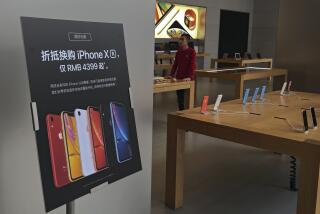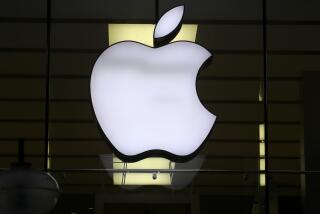What the iPhone 5s and 5c launch taught us about Tim Cook and Apple
- Share via
No matter how many iPhones Apple sells this weekend, the recent launch may be remembered best for the thing the company didn’t announce this month:
A cheap iPhone.
PHOTOS: Top 11 hidden, cool features in Apple’s iOS 7
It was the biggest surprise of all when Apple unveiled the new iPhones on Sept. 10 at its headquarters. Analysts and reporters were thoroughly convinced that the big story that day would be the revelation of a low-cost iPhone that would allow Apple to be more competitive in emerging smartphone markets.
Perhaps it was the creation of the iPhone 5c, with its plastic case, that threw everyone. Plastic sounds cheap. But when you hold the iPhone 5c, you realize it’s anything but cheap. It feels every bit as substantial as any iPhone the company has made.
It’s even more remarkable that we all got this so spectacularly wrong considering how hard it has become for the company to keep its secrets. Almost every other aspect of the iPhone event that day had been reported in one venue or another.
But here’s what, in retrospect, may be most incredible of all. Apple Chief Executive Tim Cook told us that the company wasn’t going to make a cheap iPhone.
We just didn’t listen.
Earlier this year, at a shareholder’s meeting, Cook was asked about Apple’s declining market share around the globe and what he planned to do about it.
Cook emphasized that Apple is not overly concerned with overall market share numbers.
“The focus for us is not making the most,” Cook said. “We want to make the best.”
What happens to companies that want to just make the most?
“Dell is an example of a company that wanted to make the most PCs,” Cook said. “We never wanted to do that.”
Later this summer, during an earnings conference call with analysts, Cook again said he did not buy the notion that the high-end smartphone market, which the company dominates, is saturated as many analysts believe.
“I don’t subscribe to the common view that the higher end if you will of the smartphone market is at its peak,” he said. “I don’t believe that, but we will see and we will report our result as we go along.”
As if to emphasize this point, Cook restated it in a rare interview this week with Bloomberg Businessweek.
Cook repeated that he believes there is a low-end smartphone market where companies will compete on price by offering commodity products. But not Apple.
“There’s always a large junk part of the market,” he told Businessweek. “We’re not in the junk business.”
Rather, Cook maintains that there is a higher-end market where a company like Apple will continue to be able to charge premium prices because it builds gadgets that provide unique value.
“There’s a segment of the market that really wants a product that does a lot for them, and I want to compete like crazy for those customers,” Cook told Businessweek. “I’m not going to lose sleep over that other market, because it’s just not who we are. Fortunately, both of these markets are so big, and there’s so many people that care and want a great experience from their phone or their tablet, that Apple can have a really good business.”
So that’s it. Apple ain’t going to build the cheap iPhone. And as Wall Street absorbs this fact, analysts have been busy recalculating estimates and rethinking their financial models for Apple’s business.
And as for Cook, it turns out that he’s quite direct and as plainspoken as his reputation had indicated when he became chief executive two years ago.
While Apple’s few statements are often considered to be cryptic riddles that are endlessly dissected, there may be no need to subject Cook’s words to such scrutiny. He’s willing to tell us what’s on his mind.
All we have to do is listen next time.
ALSO:
Live: Apple’s iPhone launch day
Apple fans line up to buy iPhone 5s, 5c; gold in short supply
Apple’s new iPhones go on sale; golden iPhone 5s quickly selling out
More to Read
Inside the business of entertainment
The Wide Shot brings you news, analysis and insights on everything from streaming wars to production — and what it all means for the future.
You may occasionally receive promotional content from the Los Angeles Times.











